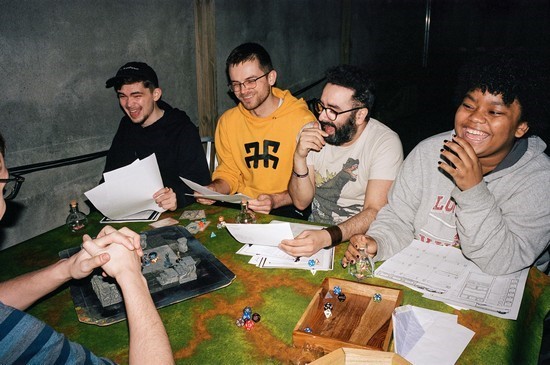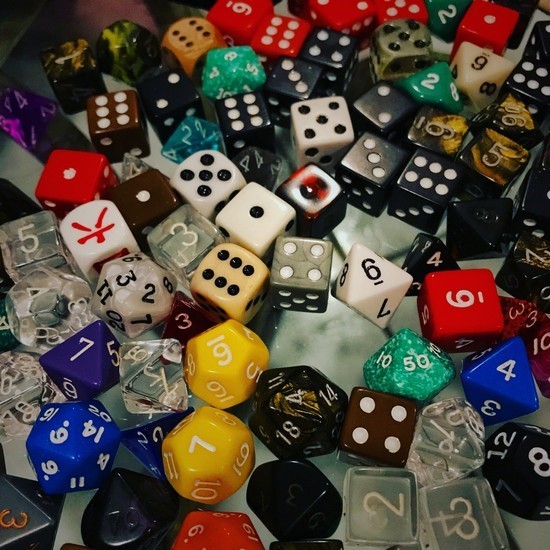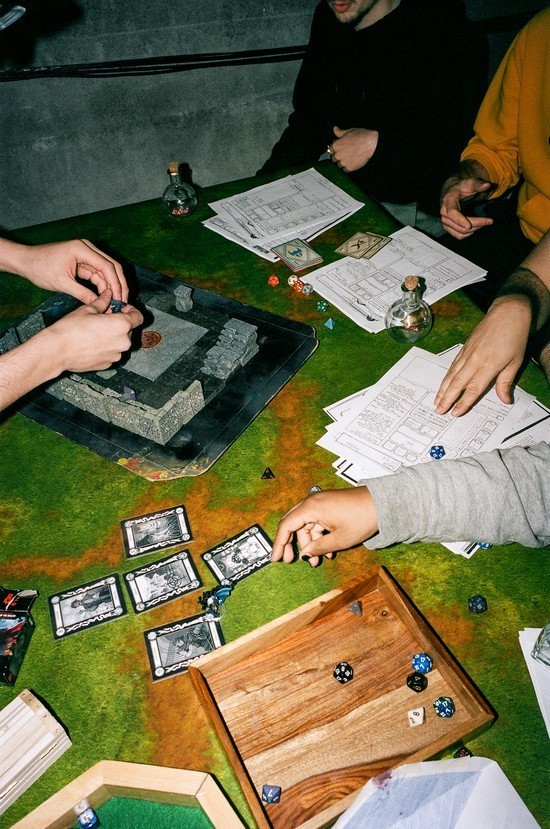Who's playing Dungeons & Dragons these days ? everyone
New York Times
last updated: May 31,2022

Everyone’s been playing Dungeons & Dragons (D&D) without you: your
co-workers, Anderson Cooper, Tiffany Haddish. More than 50 million people
worldwide have “interacted” with D&D since it was created in the mid-1970s,
according to its publisher, and while that number also includes movies, video
games, books, television, and livestreams, it doesn’t even begin to account for
the people reached over TikTok.اضافة اعلان
The tabletop role-playing game became a household name when “satanic panic” — a general fear of satanic ritual abuse that caught fire nationwide in the 1980s — began to take root in American suburbs. Anything with even a remote whiff of the occult, from astrology to heavy metal, was suspect. Since casting spells during a game could get you labeled a devil-worshipper or a nerd, Dungeons & Dragons went underground.
As a universe of dedicated players expanded steadily in the shadows, the game appeared intermittently in the pop cultural consciousness: D&D was either alluded to or mentioned by name in TV shows including “That ’70s Show,” “The Big Bang Theory,” “Community” and in the series finales of both “Buffy the Vampire Slayer” and “Freaks and Geeks.” Rivers Cuomo sings about the solace he found among his Dungeon Master’s Guide and 12-sided die in the Weezer song “In the Garage.” In “The Simpsons,” Homer says that he played Dungeons & Dragons for three hours with a new group of friends — until he was slain by an elf.

William Scott at a game of Dungeons & Dragons at the Brooklyn Strategist, April 4, 2022. (Photo: NYTimes)
Still, the general public’s impression of the game more or less remained the same: Dungeons & Dragons was for outcasts.
In the past decade, the tides of cool began to shift. Now, playing the game has become a social flex, an antidote to our more basic tendencies and cheugy proclivities.
“It’s hip to be a nerd now,” Stephen Colbert said in a 2018 interview with actor Joe Manganiello, where they spent eight whole minutes of “The Late Show” discussing their shared love of the game.
Marisha Ray, 33, a Los Angeles voice actor and cast member of “Critical Role,” one of the best known D&D livestreams, recalled a moment several years ago when she realized “the nerd kids” had become the entertainment industry. Enter a decade of Marvel films, including four directed by the Russo brothers, who grew up playing D&D. The Duffer brothers, the creators of the hit Netflix show “Stranger Things,” were influenced by tabletop role-playing games like D&D and Magic: The Gathering, the fantasy card game with its own rabid fan base. George R.R. Martin, author of the fantasy novel series upon which HBO’s “Game of Thrones” was based, is a noted J.R.R. Tolkien fan, and Tolkien novels are often cited as a gateway into D&D. (Perhaps unsurprisingly, Dave Arneson and E. Gary Gygax, the creators of Dungeons & Dragons, were enormous Tolkien fans.)
But nothing spread the good word of D&D as effectively as the internet. Video game streaming platforms such as YouTube and Twitch showed how much fun the world of tabletop games could be. Online forums like Reddit, Discord and Twitter created digital homes for role-playing game subcultures to cross-pollinate and thrive, and from there, pieces of insider gaming lingo worked their way into the meme vernacular.
Add all of that to a nearly two-year stretch when pandemic-induced isolation converged with a desperation for escapism, and there you have it: a potent spell to summon Dungeons & Dragons from the depths of our collective mother’s basement into its rightful place upstairs at the kitchen table.
Game time
This winter, I joined my first D&D game at the Brooklyn Strategist, which describes itself as a “community board game store.” My character was a Level 2 paladin orc named Atlas (after my dog) who carried a great sword, had 19 charisma points and was able to conjure divine smite. My fellow players and I partook in “Curse of Strahd,” a fifth-edition fantasy-horror adventure that, for us, began with a quest and ended on a cliffhanger, and since then I have not stopped wondering what might happen next.

The role-playing game has never been more popular, and players seem to be getting more out of it than ever before. (Photo: Envato Elements)
That is how it keeps you coming back.
A four-hour game is not uncommon. A typical D&D session takes at least three hours, and that’s just one chapter of a campaign that can last for months, if not a year. But that time commitment might not seem so intense when measured against the hours we spend on our phones, scrolling through Instagram or bingeing TV.
“Play is a part of the experience of living on this planet,” said Siobhan Thompson, 37, a cast member of Dimension 20, a popular comedic D&D livestream show on DropOut and YouTube. “The other stuff is so that we get to play, as far as I’m concerned.”
A quick playbook for those who have not delved into this world before: Players announce their characters, along with their characters’ classes, levels and races — dwarf, elf, halfling, gnome, dragonborn. With the help of an evolving rule book, seven polyhedral dice, addition skills and flexible imaginations, players determine their characters’ backgrounds, strengths, moral alignments, and traits. These identity elements factor into every decision your character makes (with rolls of specific dice, which determine the intensity and impact of the action you wish to take). The dungeon master is more an omniscient narrator than an in-game player; it’s the so-called DM who leads the players through the twisting, turning valleys of what’s to come.
The new guard will tell you that playing D&D is like doing improv around a table with your friends. A collective willing suspension of disbelief keeps the narrative moving; dice randomize the outcomes. And while it is, at its roots, a war game, it is less about winning or personal scores. The consensus among players interviewed for this article is that the real-life magic is born out of the communal storytelling.
It’s about the journey, not the destination.
New blood and new voices
It’s the newer generation of players who make D&D — and tabletop role-playing games generally — what it is today.
Dungeons & Dragons recently outlined several diversity, equity, and inclusion goals. A June 2020 blog post by Wizards of the Coast, the game’s parent company, acknowledged that “some of the peoples in the game — orcs and drow being two of the prime examples — have been characterized as monstrous and evil, using descriptions that are painfully reminiscent of how real-world ethnic groups have been and continue to be denigrated.”

People at a game of Dungeons & Dragons at the Brooklyn Strategist, April 4, 2022. (Photo: NYTimes)
A list of course corrections followed: The company changed “racially insensitive” text in recent reprintings of “Tomb of Annihilation” and “Curse of Strahd,” two D&D books that players use to run campaigns. The game said it was working with sensitivity readers, promised to “continue to reach out to experts in various fields to help us identify our blind spots” and vowed to seek “new, diverse talent” to join its staff and pool of freelance writers and artists.
For Thompson, the Dimension 20 cast member, D&D “is absolutely real to me in a way that sometimes my real life is not,” she said. She described how, during a “Game of Thrones”-themed campaign that resulted in many character casualties, she found herself crying as if someone had actually died.
That kind of intense emotion is so widespread among tabletop role-playing gamers that there’s a name for it: “bleed,” referring to the way emotions can bleed over from make-believe into reality. The release is cathartic, but perhaps more therapeutic is the act of play itself. In interviews, many players described using D&D to safely explore facets of their identity, to parse the enduring existential question of all humankind: Who am I?
Adult players described the feeling of finally finding their niches in games like Dungeons & Dragons. They spoke of reconnecting with childhood friends over virtual D&D campaigns, of overcoming childhood speech impediments and strengthening social skills, all in the comfort of a welcoming space. They spoke of meeting significant others, making lifelong friendships, of finally finding their people.
“D&D has showcased that we are an evolved species,” said Luyanda Unati Lewis-Nyawo, 34, a game-master. “We want shelter. We want warmth. We want companionship. We want to be fed, hydrated. There are basic human needs, and I think storytelling is one of them.”
Read more Gaming
Jordan News
The tabletop role-playing game became a household name when “satanic panic” — a general fear of satanic ritual abuse that caught fire nationwide in the 1980s — began to take root in American suburbs. Anything with even a remote whiff of the occult, from astrology to heavy metal, was suspect. Since casting spells during a game could get you labeled a devil-worshipper or a nerd, Dungeons & Dragons went underground.
As a universe of dedicated players expanded steadily in the shadows, the game appeared intermittently in the pop cultural consciousness: D&D was either alluded to or mentioned by name in TV shows including “That ’70s Show,” “The Big Bang Theory,” “Community” and in the series finales of both “Buffy the Vampire Slayer” and “Freaks and Geeks.” Rivers Cuomo sings about the solace he found among his Dungeon Master’s Guide and 12-sided die in the Weezer song “In the Garage.” In “The Simpsons,” Homer says that he played Dungeons & Dragons for three hours with a new group of friends — until he was slain by an elf.

William Scott at a game of Dungeons & Dragons at the Brooklyn Strategist, April 4, 2022. (Photo: NYTimes)
Still, the general public’s impression of the game more or less remained the same: Dungeons & Dragons was for outcasts.
In the past decade, the tides of cool began to shift. Now, playing the game has become a social flex, an antidote to our more basic tendencies and cheugy proclivities.
“It’s hip to be a nerd now,” Stephen Colbert said in a 2018 interview with actor Joe Manganiello, where they spent eight whole minutes of “The Late Show” discussing their shared love of the game.
Marisha Ray, 33, a Los Angeles voice actor and cast member of “Critical Role,” one of the best known D&D livestreams, recalled a moment several years ago when she realized “the nerd kids” had become the entertainment industry. Enter a decade of Marvel films, including four directed by the Russo brothers, who grew up playing D&D. The Duffer brothers, the creators of the hit Netflix show “Stranger Things,” were influenced by tabletop role-playing games like D&D and Magic: The Gathering, the fantasy card game with its own rabid fan base. George R.R. Martin, author of the fantasy novel series upon which HBO’s “Game of Thrones” was based, is a noted J.R.R. Tolkien fan, and Tolkien novels are often cited as a gateway into D&D. (Perhaps unsurprisingly, Dave Arneson and E. Gary Gygax, the creators of Dungeons & Dragons, were enormous Tolkien fans.)
But nothing spread the good word of D&D as effectively as the internet. Video game streaming platforms such as YouTube and Twitch showed how much fun the world of tabletop games could be. Online forums like Reddit, Discord and Twitter created digital homes for role-playing game subcultures to cross-pollinate and thrive, and from there, pieces of insider gaming lingo worked their way into the meme vernacular.
Add all of that to a nearly two-year stretch when pandemic-induced isolation converged with a desperation for escapism, and there you have it: a potent spell to summon Dungeons & Dragons from the depths of our collective mother’s basement into its rightful place upstairs at the kitchen table.
Game time
This winter, I joined my first D&D game at the Brooklyn Strategist, which describes itself as a “community board game store.” My character was a Level 2 paladin orc named Atlas (after my dog) who carried a great sword, had 19 charisma points and was able to conjure divine smite. My fellow players and I partook in “Curse of Strahd,” a fifth-edition fantasy-horror adventure that, for us, began with a quest and ended on a cliffhanger, and since then I have not stopped wondering what might happen next.

The role-playing game has never been more popular, and players seem to be getting more out of it than ever before. (Photo: Envato Elements)
That is how it keeps you coming back.
A four-hour game is not uncommon. A typical D&D session takes at least three hours, and that’s just one chapter of a campaign that can last for months, if not a year. But that time commitment might not seem so intense when measured against the hours we spend on our phones, scrolling through Instagram or bingeing TV.
“Play is a part of the experience of living on this planet,” said Siobhan Thompson, 37, a cast member of Dimension 20, a popular comedic D&D livestream show on DropOut and YouTube. “The other stuff is so that we get to play, as far as I’m concerned.”
A quick playbook for those who have not delved into this world before: Players announce their characters, along with their characters’ classes, levels and races — dwarf, elf, halfling, gnome, dragonborn. With the help of an evolving rule book, seven polyhedral dice, addition skills and flexible imaginations, players determine their characters’ backgrounds, strengths, moral alignments, and traits. These identity elements factor into every decision your character makes (with rolls of specific dice, which determine the intensity and impact of the action you wish to take). The dungeon master is more an omniscient narrator than an in-game player; it’s the so-called DM who leads the players through the twisting, turning valleys of what’s to come.
The new guard will tell you that playing D&D is like doing improv around a table with your friends. A collective willing suspension of disbelief keeps the narrative moving; dice randomize the outcomes. And while it is, at its roots, a war game, it is less about winning or personal scores. The consensus among players interviewed for this article is that the real-life magic is born out of the communal storytelling.
It’s about the journey, not the destination.
New blood and new voices
It’s the newer generation of players who make D&D — and tabletop role-playing games generally — what it is today.
Dungeons & Dragons recently outlined several diversity, equity, and inclusion goals. A June 2020 blog post by Wizards of the Coast, the game’s parent company, acknowledged that “some of the peoples in the game — orcs and drow being two of the prime examples — have been characterized as monstrous and evil, using descriptions that are painfully reminiscent of how real-world ethnic groups have been and continue to be denigrated.”

People at a game of Dungeons & Dragons at the Brooklyn Strategist, April 4, 2022. (Photo: NYTimes)
A list of course corrections followed: The company changed “racially insensitive” text in recent reprintings of “Tomb of Annihilation” and “Curse of Strahd,” two D&D books that players use to run campaigns. The game said it was working with sensitivity readers, promised to “continue to reach out to experts in various fields to help us identify our blind spots” and vowed to seek “new, diverse talent” to join its staff and pool of freelance writers and artists.
For Thompson, the Dimension 20 cast member, D&D “is absolutely real to me in a way that sometimes my real life is not,” she said. She described how, during a “Game of Thrones”-themed campaign that resulted in many character casualties, she found herself crying as if someone had actually died.
That kind of intense emotion is so widespread among tabletop role-playing gamers that there’s a name for it: “bleed,” referring to the way emotions can bleed over from make-believe into reality. The release is cathartic, but perhaps more therapeutic is the act of play itself. In interviews, many players described using D&D to safely explore facets of their identity, to parse the enduring existential question of all humankind: Who am I?
Adult players described the feeling of finally finding their niches in games like Dungeons & Dragons. They spoke of reconnecting with childhood friends over virtual D&D campaigns, of overcoming childhood speech impediments and strengthening social skills, all in the comfort of a welcoming space. They spoke of meeting significant others, making lifelong friendships, of finally finding their people.
“D&D has showcased that we are an evolved species,” said Luyanda Unati Lewis-Nyawo, 34, a game-master. “We want shelter. We want warmth. We want companionship. We want to be fed, hydrated. There are basic human needs, and I think storytelling is one of them.”
Read more Gaming
Jordan News

